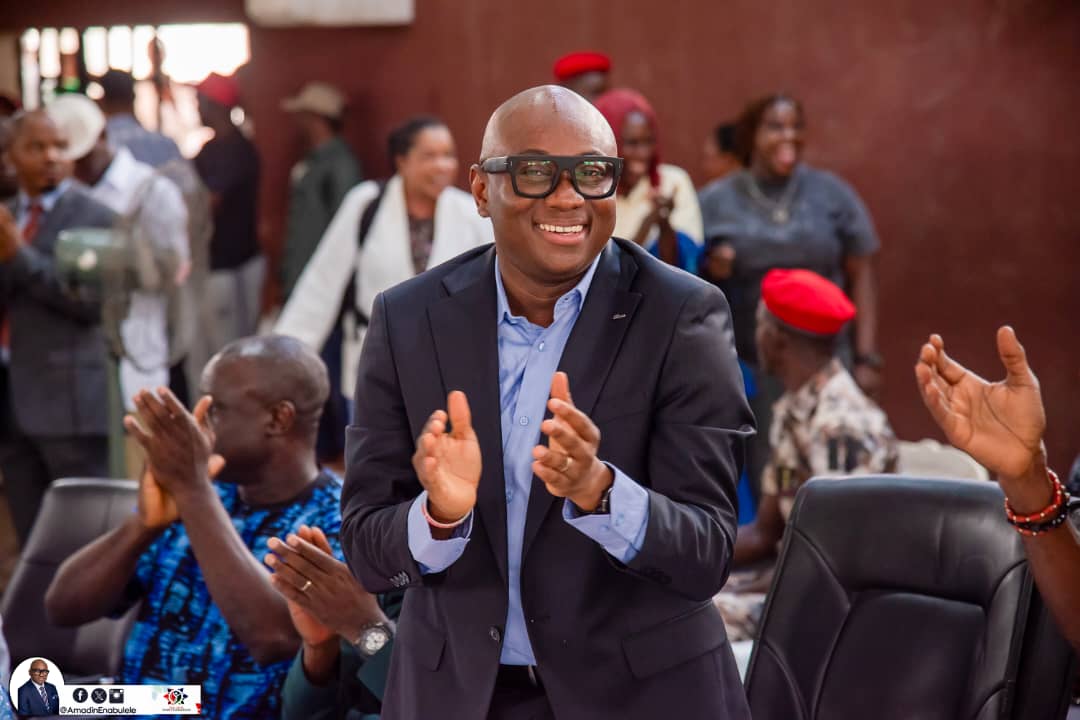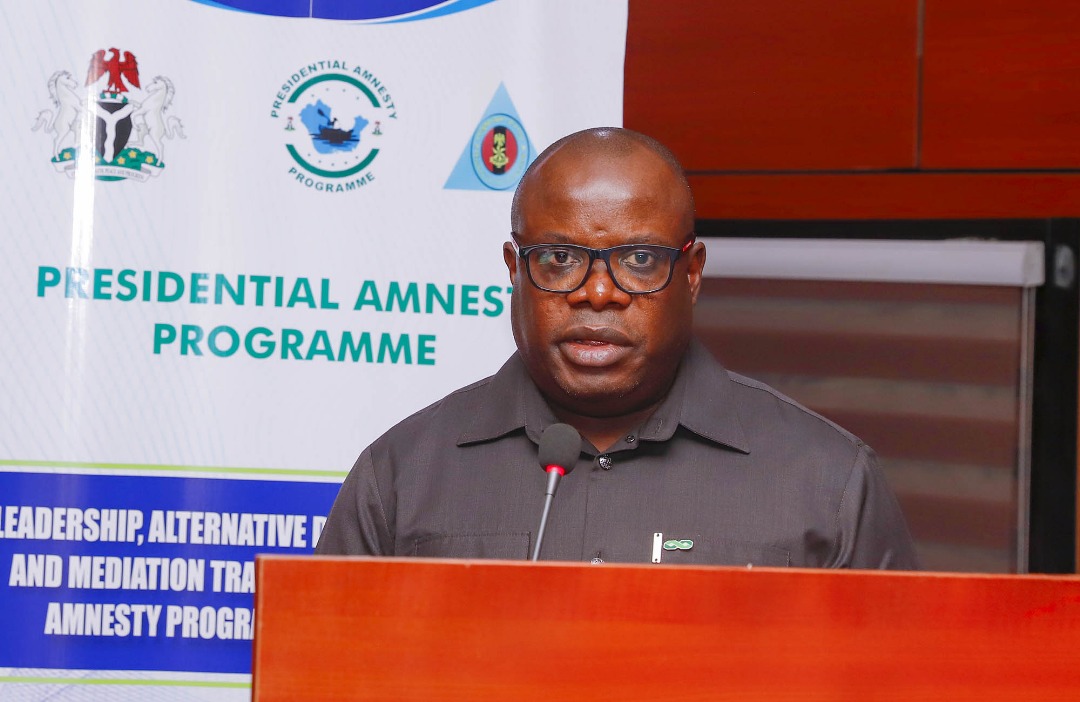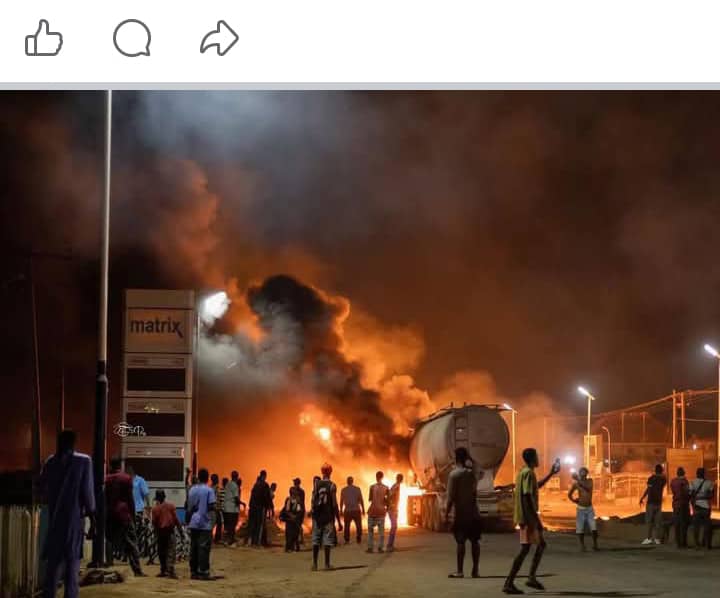News
Fubara Presents N1.188tn 2025 Budget To Rivers Assembly

The Rivers State Governor, Siminalayi Fubara, has presented N1.188 trillion as a budgetary estimate for the 2025 fiscal year to the State House of Assembly for consideration and approval.
This figure is an increase from the 2024 budget of N800 billion that was presented in 2023 to the Assembly.
Fubara presented the 2025 Appropriation Bill shortly after delivering his address to lawmakers at the Assembly Auditorium, Administrative Block of Government House in Port Harcourt on Monday.
He said the 2025 budget, christened “Budget of Inclusive Growth and Development,” will be implemented to achieve sustainable economic growth and accelerate the development of the state while improving the living standards of all residents.
Fubara explained that with the set-out objectives, the 2025 budget will strengthen the capacity of the state to weather possible external shocks from the volatility of the national economy while building a resilient economy that will advance the collective development and prosperity of the people.
READ ALSO: Fubara Prevented Wike From Making Rivers His Private Estate – Former Gov, Odili
He said, “The total projected revenue for Rivers State for the 2025 fiscal year is N1,188,962,739,932.36.
“Two components of the budget are constituted as follows: Recurrent Expenditure of N462,254,153,418.98; Capital Expenditure of N678,088,433,692.03; Planning Reserve of N35,688,864,931.16; and a closing balance of N12,931,287,890.1935.
“This gives a Recurrent/Capital Expenditure ratio of 44:56%, indicating the sincere commitment of our administration to both infrastructural and human capital development of our people and state.”
The governor said nearly N31 billion has been allocated to support interventions in agricultural development to ease the implementation of a comprehensive agriculture transformation and support programme for Rivers youths in order to significantly resolve issues of youth unemployment and poverty.
He emphasised that the commitment is also to address food insecurity in Rivers State, and provide land preparation, farm inputs, and extension services, including training, tractors, and access to improved seedlings and fertilisers to farmers to enhance their productivity and farm yields.
READ ALSO: Why Nigeria Will Continue To Produce Fossil Fuels – Lokpobiri
In education, Governor Fubara assured that his administration will continue to provide access to quality education at all levels, enabling Rivers children to have the knowledge and skills they need to excel in their careers and contribute to the development of the state.
The governor said, “Consequently, we have proposed to spend over N63 billion, representing 9.3% of the budget on education in fiscal year 2025.
“With this, we shall access all outstanding matching grants from the Universal Basic Education Commission to rehabilitate, equip and furnish dilapidated public primary and junior secondary schools, and continue to provide free basic education to our children.
“We will also rehabilitate, equip and furnish as many senior secondary schools as possible across the State, including the provision of new classrooms, perimeter fencing, water and electricity, to provide a conducive environment for effective teaching and learning to take place.
“We shall work with the school-based management boards, administrators, parents and teachers to fix our broken school system, improve enrollments, keep learners in school, promote effective teaching, and improve learning outcomes.”
READ ALSO: Rivers Crisis: I Can’t Donate My Kidney, Liver To Be Loyal To Anybody – Fubara[VIDEO]
Fubara said with the proposed N97.750 billion for the health sector, representing 14.4% of the budget, all zonal hospitals, the upgraded neuropsychiatric hospital, and the new general hospital at Rumuigbo under reconstruction will be completed to provide quality and affordable healthcare services to the people of the State.
He also assured of rehabilitating more general hospitals and health centres across the state, ensuring the procurement of essential drugs, medical supplies and equipment for effective and efficient healthcare delivery, while also providing more infrastructure to strengthen the capacity of the Rivers State University Teaching Hospital for quality, effective, and efficient tertiary healthcare services.
On Road and Transport Infrastructure, Governor Fubara said over N195 billion has been earmarked to complete all ongoing road projects and initiate new ones, support and facilitate the modernisation of the public transport system through necessary incentives to improve the quality of public transportation services in the State.
Fubara assured that all ongoing electrification projects, including delivering transformers and replacing the generator-powered streetlights with solar energy-powered streetlights across Port Harcourt and Obio/Akpor Local Government Areas, will be concluded and restated the determination to ensure the passage of the Rivers State Electricity Market Bill to regulate and open the State’s energy sector for private sector investments in order to achieve energy security and accelerate the industrialization of Rivers State.
He said, “In Social Development and Investments, Mr Speaker, we have proposed to spend N15.4 billion for the social development subsector of our economy to advance youth and gender empowerment, jobs and wealth creation, sports development, and social inclusion.
READ ALSO: PDP Crisis: Drama As Fubara’s Candidates Contest Rivers Council’s Poll On APP Platform
“We will collaborate with Local Government Councils to establish youth resource and digital transformation centres to enable access to digital tools, Internet services and training programmes for our youths to become economically successful and sufficiently self-reliant.
“We will also continue to support and strengthen the capacity of state-owned sporting teams, especially Rivers United, Rivers Angels, and the Hoopers, to enable them to excel and win more laurels in both national, regional and international contests.”
Fubara, who said the 2025 will be funded from FAAC, Internally Generated Revenue, Statutory Allocations, Mineral Funds, Valued Added Tax, Refunds/Escrow/ECA and others, explained that the 2014 budget performed excellently with the IGR figure hitting N100billion increase over the 2023 figure.
In his speech, the Speaker of Rivers State House of Assembly, Victor Oko-Jumbo, applauded Fubara for recording over N100 billion increase in IGR, which he said shows a high level of transparency and accountability in governance, with the plugging of financial leakage, adding that it is also a testament to how attractive Rivers investment climate has become.
Oko-Jumbo pledged the continual support of the Legislature to the executive to ensure that the governor remains focused, sustains financial prudence, delivers democratic dividends, and to make life better for the people.
News
Grassroots To Global Podium: Edo Sports Commission Marks Enabulele’s First Year In Office

The Indoor Sports Hall in Benin City came alive on Wednesday as the Edo State Sports Commission rolled out the drums to celebrate the first anniversary in office of its Executive Chairman, Hon. Amadin Desmond Enabulele. Management, staff, coaches and athletes gathered in an atmosphere charged with pride, reflection and optimism.
The colourful ceremony drew executives and members of various sports associations, officials of the Sports Writers Association of Nigeria (SWAN), coaches, athletes and other key stakeholders in Edo sports.
In her welcome address, the Acting Permanent Secretary of the Commission, Mrs. A. P. Amenze, praised Hon. Enabulele for what she described as focused and purposeful leadership. She said the past year had seen renewed confidence, discipline and energy return to the state’s sports ecosystem.
Adding excitement to the event were exhibition bouts and demonstrations by the Kung Fu, Karate, Taekwondo and Judo associations, staged in honour of the Executive Chairman.
READ ALSO:2025 NYG: Enabulele Charges Edo Coaches On Performance
Speaking for SWAN Edo State, Chairman Comrade Kehinde Osagiede commended Hon. Enabulele’s open-door leadership style and consistent support for sports development. He noted that the Commission had effectively driven Governor Monday Okpebholo’s “Catch Them Young” policy through practical grassroots programmes that identify and groom young talents across the state.
In recognition of his contributions to sports development and media relations, Comrade Osagiede conferred the Patronship of SWAN Edo State on Hon. Enabulele and presented him with a special anniversary card.
Goodwill messages followed from Executive Directors of the Commission, including Hon. Frank Ilaboya (Edo North), Coach Baldwin Bazuaye, MON (Edo South), Barr. Anthony Ikuenobe (Edo Central), and Mrs. Sabrina Chikere, Executive Director, Sports Development and Operations. Representatives of coaches, athletes and sports associations also took turns to acknowledge the progress recorded under the current leadership.
In his stewardship address, Hon. Enabulele expressed gratitude to Governor Monday Okpebholo and Deputy Governor Rt. Hon. Dennis Idahosa for the trust placed in him, noting that their backing and shared vision had driven the Commission’s achievements.
READ ALSO:Enabulele Lauds Okpehbolo For Creating Enabling Environment For Football To Thrive
He highlighted Team Edo’s third-place finish at the 9th National Youth Games in Asaba, where the state recorded its best-ever outing with 79 medals—33 gold, 18 silver and 28 bronze—reinforcing Edo’s reputation as a national sports powerhouse.
The Chairman also pointed to the impact of inclusive and grassroots sports programmes, citing Favour Ojeabu, a visually impaired para-cyclist who won three gold medals to emerge Africa’s champion at the African Track Para-Cycling Championship in Egypt.
Other milestones listed included outstanding performances by Edo para powerlifters on the international stage, historic achievements in cricket, weightlifting, cycling, judo and deaf athletics, as well as structural reforms such as the repositioning of Bendel Insurance FC and deeper investment in grassroots sports development.
Cultural performances added colour and tradition to the celebration, as stakeholders closed the event united in their assessment of the past year as a truly transformative period for sports development in Edo State.
News
Otuaro Tasks Media On Objective Reportage

The Administrator, Presidential Amnesty Programme (PAP) Dr. Dennis Otuaro has charged media practitioners particularly members of the Ijaw Publishers’ Forum to promote ethical journalism through their reportage.
He gave the charge in Warri on Wednesday during the 2nd Annual Ijaw Media Conference organised by the Ijaw Publishers’ Forum (IPF).
Represented by Princewill Binebai, spokesman, Ijaw Youth Council (IYC) Worldwide, Otuaro while stating that the Niger Delta stories have been told in such a way that is quite different from what is obtainable in the real sense, said this, IPF must do everything possible to correct.
The administrator added: “I am happy that Ijaw journalists have boldly come out together to champion the Ijaw struggle in a very dynamic perspective”.
READ ALSO:IPF Hosts Media Conference, Seeks Protection For N’Delta Environment
“The Ijaw story was misrepresented over the years, but IPF’s emergence had corrected this error and the story is gradually changing for better.”
Otuaro, however, challenged Ijaw media practitioners to be objective, truthful, accurate and fearless in their reportage to correct many years anomalies of the Ijaw struggle.
He admonished members of IPF to see themselves as brothers and love one another in the discharge of their activities to achieve a common goal.
News
Police Confirm Edo Tanker Explosion, say No Casualty

The Edo State Police Command has confirmed tanker explosions that rocked Auchi, the administrative headquarters of Etsako West Local Government Area of the state.
The Command’s Police Publice Relations Officer, Eno Ikoedem, who confirmed the incident via the phone, said the explosion occurred at about 6:30 p.m. following the fall of a fuel tanker along the road.
Ikoedem said the incident occurred on Wednesday evening at about 6:30 p.m. following the fall of a fuel tanker along the road.
READ ALSO:Edo SSG Calls On Media To Support Govt Policies, Assures Better Welfare
She explained that spilled fuel seeped into underground tunnels, which later ignited and caused three explosions in different parts of the Auchi community.
According to her, officers from the Auchi Divisional Police Headquarters and the Area Command were mobilised to the affected areas and successfully cordoned them off to prevent loss of lives.
She added: “No casualty was recorded. Our men on ground were able to cordoned the affected areas.”
READ ALSO:Edo Assembly Declares Okpebholo’s Projects Unprecedented
It was gathered that three separate explosions rocked the town simultaneously in different parts, which led to properties worth millions of naira destroyed.
A resident who does not want his name in print said via the telephone that the blasts occurred along Igbei Road, Igbo Shade, and along the Auchi–Okene Road, close to Winners Junction.
The resident, who alleged the explosions appeared to have been coordinated, called for a thorough investigation into the incident to prevent future occurrences.
Calls put across to Mr. Monday Edogiawere, Chairman, Red Cross, Edo State, were not picked.

 Metro3 days ago
Metro3 days agoSuspected Kidnappers Abduct 18 Passengers On Benin-Akure Road

 News3 days ago
News3 days agoI’m Not Distracted By Anti-Niger Delta Elements, Says PAP Boss, Otuaro

 News3 days ago
News3 days agoOPINION: Time For The Abachas To Rejoice

 News4 days ago
News4 days agoEdo Assembly Charges Contractor Handling Ekekhuan Road To Accelerate Work

 Sports3 days ago
Sports3 days agoJUST IN: Dembélé Named FIFA Best Men’s Player, Bonmatí Wins Women’s Award

 News3 days ago
News3 days agoWage Dispute: Court Orders PSG To Pay Mbappe €61 Million

 Metro3 days ago
Metro3 days agoNDLEA Seizes 457kg of Cannabis, Arrests Suspected Trafficker In Edo

 Business2 days ago
Business2 days agoCBN Revokes Licences Of Aso Savings, Union Homes As NDIC Begins Deposit Payments

 News3 days ago
News3 days agoEx-Nigerian Amb., Igali, To Deliver Keynote Address As IPF Holds Ijaw Media Conference

 Headline2 days ago
Headline2 days agoAircraft Crashes In Owerri With Four Persons Onboard
































